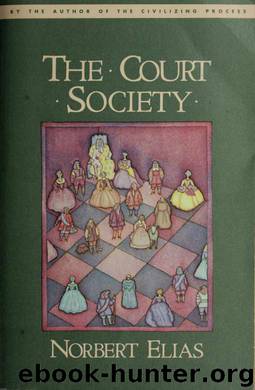The court society by Norbert Elias

Author:Norbert Elias [Elias, Norbert]
Format: mobi
Publisher: New York : Pantheon Books
Published: 2019-03-29T16:00:00+00:00
king's power in relation to the nobility, while greater than that of any preceding king, was less than Louis XIV's. He was not yet so preponderant as the latter nor, therefore, so distanced from his nobles.
4. Louis XIV, while living amidst court society, had become its only centre to a greater extent than any of his predecessors. The balance of forces between the king and the noble society to which he belonged had been totally displaced. Between him and the rest of the nobility there was now an immense distance. Nevertheless, this was a distance within one and the same social stratum. What is paradigmatically expressed in this knightly game is true of the whole position of Louis XIV within the court nobility, and of his attitude towards it: this nobility was his society. He belonged to it and needed it. But at the same time he distanced himself from it to the same degree as his power position raised him above all the other nobles.
In Louis XIV's behaviour towards the court nobility, therefore, two tendencies are always intertwined. These determine the position of the nobility within the power structure and, embodied in and constantly reproduced by the institutions, remain characteristic of his successors up to the end of the regime. First, there is a tendency to establish and secure the absolute personal power of the king by institutions of all kinds against the claims of the great and petty nobility; second, there is a tendency to preserve the nobility as an estate dependent on and serving the king, but distinct from all other classes and with its own specific culture, this being the only adequate society for the king.
This ambivalent attitude of the king towards the nobility, which from now on was of decisive importance in shaping that class, did not express the personal whim of a single ruler but was enforced by the situation that had slowly developed in the course of the sixteenth century. This development gave rise to a specific figuration in which the nobility was deprived of the foundation of its social position and eminence together with a major part of its economic power, while the kings were given huge new opportunities arising from their function. The kings were bound to the nobility by origin and culture; through the social development of France they moved further and further from the position of & primus inter pares to a power position that left all the other nobles in their realm far behind. The solution to the conflicts arising from this simultaneous participation and pre-eminence was provided by the court.
There had been a conflict between the nobility and the monarchy in France for a long time. Its causes up to the seventeenth century can
Download
This site does not store any files on its server. We only index and link to content provided by other sites. Please contact the content providers to delete copyright contents if any and email us, we'll remove relevant links or contents immediately.
Nudge - Improving Decisions about Health, Wealth, and Happiness by Thaler Sunstein(7707)
The Fire Next Time by James Baldwin(5446)
iGen by Jean M. Twenge(5416)
Adulting by Kelly Williams Brown(4574)
The Sports Rules Book by Human Kinetics(4387)
The Hacking of the American Mind by Robert H. Lustig(4383)
The Ethical Slut by Janet W. Hardy(4253)
Captivate by Vanessa Van Edwards(3839)
Mummy Knew by Lisa James(3693)
In a Sunburned Country by Bill Bryson(3542)
The Worm at the Core by Sheldon Solomon(3487)
Ants Among Elephants by Sujatha Gidla(3467)
The 48 laws of power by Robert Greene & Joost Elffers(3291)
Suicide: A Study in Sociology by Emile Durkheim(3022)
The Slow Fix: Solve Problems, Work Smarter, and Live Better In a World Addicted to Speed by Carl Honore(3009)
The Tipping Point by Malcolm Gladwell(2923)
Humans of New York by Brandon Stanton(2873)
Get What's Yours for Medicare: Maximize Your Coverage, Minimize Your Costs by Philip Moeller(2732)
Handbook of Forensic Sociology and Psychology by Stephen J. Morewitz & Mark L. Goldstein(2705)
